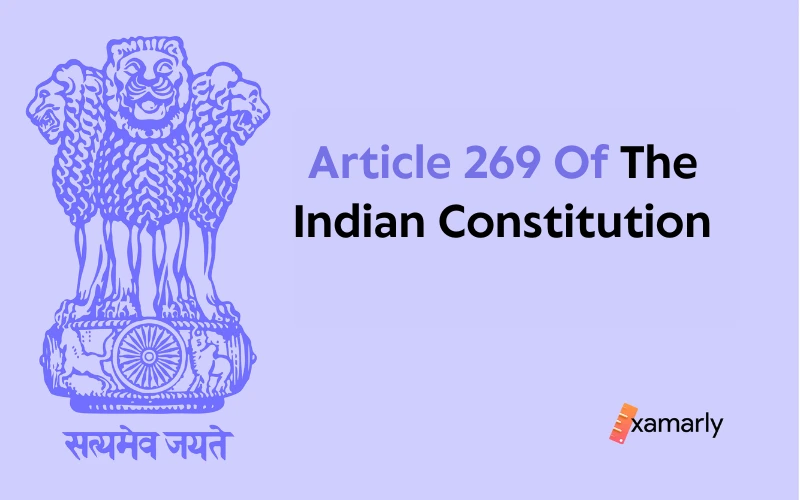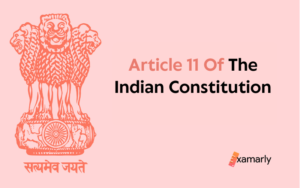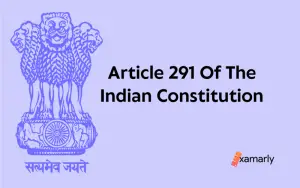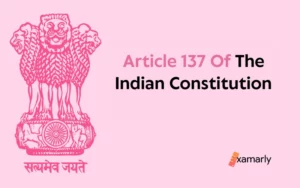In India, there is actually a way for the government to collect taxes on behalf of the Union and allocate them to the States for use in specific activities. This process is stated in the Constitution’s Article 269.
The Indian Constitution states that all taxes must be imposed and collected by the Union, other than what it allocates to the States. The Central Government then uses its discretion to engage in allocations that benefit different regions within India.
Article 269 of the Indian Constitution outlines how taxes should be imposed and collected by the Union, while also providing a procedure that takes into consideration regional disparity. Understanding what falls under this provision is essential to appreciating how different levels of government interact financially.
Thus, let us take an in-depth look at Article 269 and Article 269A and better understand how this portion of our constitution applies.
Article 269 of the Indian Constitution
In Article 269 of the Indian Constitution, taxes imposed and collected by the Union but allocated to the States are covered. Its provisions are laid in the following three clauses:
- Except as stated in article 269A, taxes on the sale, purchase, and consignment of commodities must be assessed and collected by the Government of India; however, on or after April 1, 1996, they must be assigned to the States and are presumed to have been assigned to them in accordance with clause (2).
Explanation — For the intent of this clause,—- (a) when referring to “taxes on the sale or purchase of goods,” “taxes on the sale or purchase of goods” means taxes imposed on the sale or purchase of items other than newspapers when such transactions occur during interstate trade or commerce;
- (b) The phrase “taxes on the consignment of goods” refers to taxes on the consignment of products (whether the consignment is to the individual making it or to any other individual), when such consignment occurs in the context of inter-State trade or commerce.
- Except insofar as they represent proceeds attributable to Union territories, the net proceeds of any such tax in any financial year are not to be included in the Consolidated Fund of India; instead, they are to be assigned to the States within which the tax is leviable in that year and distributed among those States in accordance with any distribution principles that may be established by law by Parliament.
- When a sale or purchase of products, or the consignment of goods, takes place in the course of interstate trade or commerce may be determined by principles established by law, which may be formulated by the Parliament.
Which Amendment Has Revised Article 269?
The following amendments have revised and updated Article 269 with time:
- 6th amendment of the Indian Constitution
- 46th amendment of the Indian Constitution
- 80th amendment of the Indian Constitution
- 101 amendment of the Indian Constitution
Note: Check out the linked articles from the list mentioned above to learn about them.
Article 269A Of The Indian Constitution
Article 269A of the Indian Constitution discusses the imposition and collection of the goods and services tax during interstate trade or commerce. Its provisions are outlined in the following 5 clauses:
- The Government of India shall levy and collect the goods and services tax on supplies made during interstate trade or commerce, and such tax shall be distributed between the Union and the States in accordance with any provisions of law that Parliament may make based on the recommendations of the goods and services tax council.
Explanation: For the objectives of this clause, the supply of goods, services, or both during the importation into Indian territory shall be understood to constitute the supply of goods, services, or both during interstate trade or commerce. - The sum that is allotted to a state in accordance with clause (1) is not considered to be a part of the Consolidated Fund of India.
- Amounts collected as tax imposed under clause (1) that have been utilized to pay taxes imposed by a State under article 246A of the Indian Constitution are not included in the Consolidated Fund of India.
- When a State’s tax collection obtained under article 246A is utilized to pay the tax imposed under clause (1), that amount does not become a component of the State’s Consolidated Fund.
- Parliament may establish by law the principles for identifying the location of a supply and whether a supply of commodities, services, or both occur during interstate trade or commerce.
When Article 269A Has Been Inserted?
In 2016, with the passage of the 101st constitutional amendment act, the said Article is included in the Constitution of India.
Conclusion
Article 269 of the Indian Constitution discusses taxes imposed and collected by the Union but allocated to the States.
In 1956, 2000, and 2016, amendments to Article 269 were made in order to reduce the number of levies that it provided to just two. There are two types of taxes: first, taxes on the sale or purchase of goods, and second, taxes on the consignment of commodities. However, the scope of this Article did not apply to the goods and services tax relating to interstate trade or commerce as allowed for in Article 269A.
FAQs
When Article 269A Was Inserted In The Indian Constitution?
Article 269A was inserted in the year 2016 by the 101st amendment of the Indian Constitution.
What Article 269 Of The Constitution Of India Deals With?
The Indian Constitution’s Article 269 addresses taxes levied and collected by the Union but distributed to the States.
What Is Article 246A All About?
Article 246A covers the specific provisions pertaining to the Goods and Services Tax (GST) in India.
What Is Clause 5 Of Article 269A?
The rules for determining where a supply occurs and whether it involves the supply of goods, services, or both during interstate trade or commerce may be established by law by Parliament.






